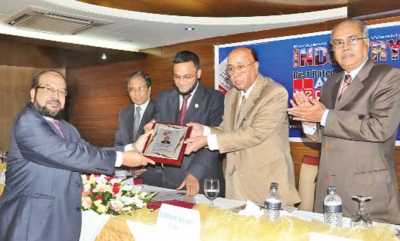Banking
President & Chief Executive Officer of Woori Bank Korea Lee, Soon Woo arrives in Dhaka tomorrow
 Lee, Soon Woo
Lee, Soon Woo
Woori Bank chief due tomorrow
President & Chief Executive Officer of Woori Bank Korea Lee, Soon Woo arrives in Dhaka tomorrow ( November 20) on a two-day official visit in Bangladesh.
During his stay, he will meet Abul Hasan Mahmud Ali ,Minister for Disaster Management & Relief for donating 5000 pieces of T-Shirts as a part of 'Glocal CSR activities'.
Mr Woo will also meet Dr Atiur Rahman ,Governor of Bangladesh Bank and corporate customers of Woori Bank Bangladesh, visit Woori Bank Dhaka for CSR Programme, factories of Corporate Customer of Woori Bank Bangladesh located at Dhaka Export Processing Zone.
He will be accompanied by high officials of Woori Bank Korea.
News: The Daily Financial Express/Bangladesh/19-Nov-12
Islamic banking promotes economic development with distributive justice
Md Abdus Salam in the third of his four-part article entitled 'Necessity of alternative financial system'
From the operational point of view, the Islamic banking system is based on prohibition of interest rates and sharing risks with the loan recipients and the investors. Conventional banks' capital intermediation activity is based on payment of an interest rate and is determined in the percentage of a stake set in the contract.
Islamic banking has shown a new conception of the relationship between economic activity and religion. Its "raw material" is not money but a new network of relations, collaborations and participations, not aimed at dividend maximisation but a new approach to the conduct of business, in which moral motivations and sustainable development could find a place.
Objectives of Islamic banking: In line with the principles of maqasid-al-shariah, Islamic banks pursue the following objectives in their operations:
n Support promotion of economic development with distributive justice.
n Optimum allocation of scarce resources by allocating financial resources in terms of profitability.
n Ensure equitable distribution of income and resources among the participating parties: the bank, the depositors and the entrepreneurs.
Strength and efficiency of Islamic banking: Islamic banking, essentially known as profit-loss-sharing banking, is conceived as more production-oriented and growth-promoting than conventional banking. This is because such a bank's earnings are directly linked to the earnings generated from the venture financed by it. Further, replacement of interest with the principle of profit-loss sharing increases the opportunity of investments in an economy. It also promotes efficient allocation of financial resources, ensures equitable distribution of income and promotes stability in the economy. Thus, Islamic banking is efficient by all macroeconomic efficiency considerations.
Investment decision in conventional banking: In conventional banking, the rate of return to the bank is fixed regardless of the profitability of the project it has financed. The case is opposite what happens with the Islamic banking.
Investment decision in Islamic banking: Under Islamic banking (technically known as the profit-loss sharing system of investment financing), the bank receives a variable rate of return as it shares a percentage of the profit earned by the entrepreneur. Thus, the profit-loss-sharing system of investment financing may be termed a Variable Return Mechanism (VRM). Since the Islamic banking system does not charge interest on any financing transaction, neither the bank nor the client receives or pays a fixed rate of return on an investment financed.
Efficient allocation of resources and Islamic banking: The Islamic banking system is very efficient in allocating resources in the economy. Allocation efficiency is concerned with the best possible utilisation of the community's scarce financial resources so as to attain the maximum benefit for the society. There are two broad ways to promote economic welfare in a world of scarcity: (a) prioritise the projects in order of social benefits and allocate the resources accordingly until the resources are exhausted, and (b) meet each obligation with the least possible amount of resources.
News: The Daily Financial Express/Bangladesh/19-Nov-12
IDRA to launch rating for insurance cos Offsite supervision to protect interests of policy holders
The insurance regulator is set to introduce offsite supervision to develop a sound and vibrant insurance industry in the country.
The offsite supervision -- CARAMEL -- like the central bank's CAMELS rating, will be based on analyses upon seven indicators - capital adequacy, asset quality, reinsurance, actuarial issues, management efficiency, earnings and profitability and liquidity -- to be evaluated on a scale of one to six.
This is the latest move in a series of reforms, initiated by the Insurance Development and Regulatory Authority (IDRA), as it seeks to stamp out graft and ensure efficiency in one of the key financial sectors.
The regulator wants to publish the rating for both life and non-life insurance companies by the end of this year, based on their performance in 2011.
IDRA chairman M Shefaque Ahmed said: "This will help improve the image of our insurance industry."
Mr Ahmed said it will protect the interests of policy-holders, their beneficiaries and potential policy-holders.
The IDRA chief said during preparation of CARAMEL, two types of supervisions -- off-site and on-site - will be conducted for ensuring consistency of the supervisory functions in line with the best international practices and principles.
An off-site supervision focuses on various returns and reports, including statutory reports, to see whether the facts and figures reported therein are correct and mutually consistent with each other.
If any information appears suspicious, it is referred to the on-site inspection team to examine books and accounts of the insurer concerned at its place of business.
The IDRA sources said the off-site supervision team will also identify the problem areas and refer those to the on-site supervision team for specific investigation.
News: The Daily Financial Express/Bangladesh/19-Nov-12
Govt, ADB for expediting project execution
The joint portfolio review meeting of the government and the Asian Development Bank (ADB) on the ADB assisted projects in Bangladesh ended here Sunday with a focus on improving the implementation process. The joint portfolio review meeting between the government of Bangladesh and the ADB took place during November 7-18 in the capital to further improve development outcomes, said an ADB release.
The review meeting concluded through a wrap-up meeting chaired jointly by Iqbal Mahmood, Senior Secretary of the Economic Relations Division and ADB Country Director M Teresa Kho.
Senior government officials, project directors, and ADB officials from its headquarters and the Bangladesh Resident Mission joined the meeting.
The discussions in the joint portfolio review meeting highlighted reducing start-up delays, early preparation and approval of Development Project Proposal (DPP), and strict adherence to project readiness filters in processing the ADB- assisted projects.
Teresa Kho in a statement said, “This review meeting is aimed at delivering faster development results and benefits to the people of Bangladesh by identifying project implementation bottlenecks and constraints to achieve development objectives.”
She said that the review meet agreed on time-bound actions with monitoring targets to improve the performance of the portfolio. ADB’s assistance to Bangladesh currently amounts at around one billion US dollars a year.
As one of the lead development partners in energy, water supply and sanitation, education, and transport sectors, ADB’s cumulative lending to Bangladesh amounts to $13.26 billion for 220 loans, while the technical assistance (TA) grants for 413 TA projects stood at $220.66 million until November 2012.
News: The Daily Independent/Bangladesh/19-Nov-12
Islami Bank MD honoured as Remittance Ambassador
 Mohammad Abdul Mannan, Managing Director of Islami Bank Bangladesh Limited, receives Remittance Ambassador of Bangladesh award at a function in Dhaka Saturday.
Mohammad Abdul Mannan, Managing Director of Islami Bank Bangladesh Limited, receives Remittance Ambassador of Bangladesh award at a function in Dhaka Saturday.
Mohammad Abdul Mannan, Managing Director of Islami Bank Bangladesh Limited has received Remittance Ambassador of Bangladesh award.
Dr. AB Mirza Azizul Islam, former adviser of the caretaker government handed over the ‘Remittance Ambassador Award’ to Mohammad Abdul Mannan at a hotel in Dhaka Saturday.
‘The Industry’, a financial weekly magazine announced the award considering the outstanding contribution of Md. Abdul Mannan to attract remittance from the expatriates through banking channel.
Besides, the Bank was awarded “Best Rated Bank Award-2012” for CAMELS rating.
Enayet Karim, Editor of The Industry presided over the function.
Ataul Haq, former deputy governor, Bangladesh Bank, Md. Nurul Amin, President, ABB, Shah Md. Nurul Alam, President, Global Economic Forum Bangladesh Chapter, CEOs and top executives of different banks attended the function.
This is to mention that IBBL is the best performer among the public and private sector commercial banks and foreign banks operating in the country in receiving remittance from the expatriates residing in different countries especially from the Middle East states.
Till October 2012, the Bank has collected a total of $ 3257.13 million remittance while the total national volume of remittance in the said period is $11755.18 million.
News: The Daily Sun/Bangladesh/19-Nov-12



